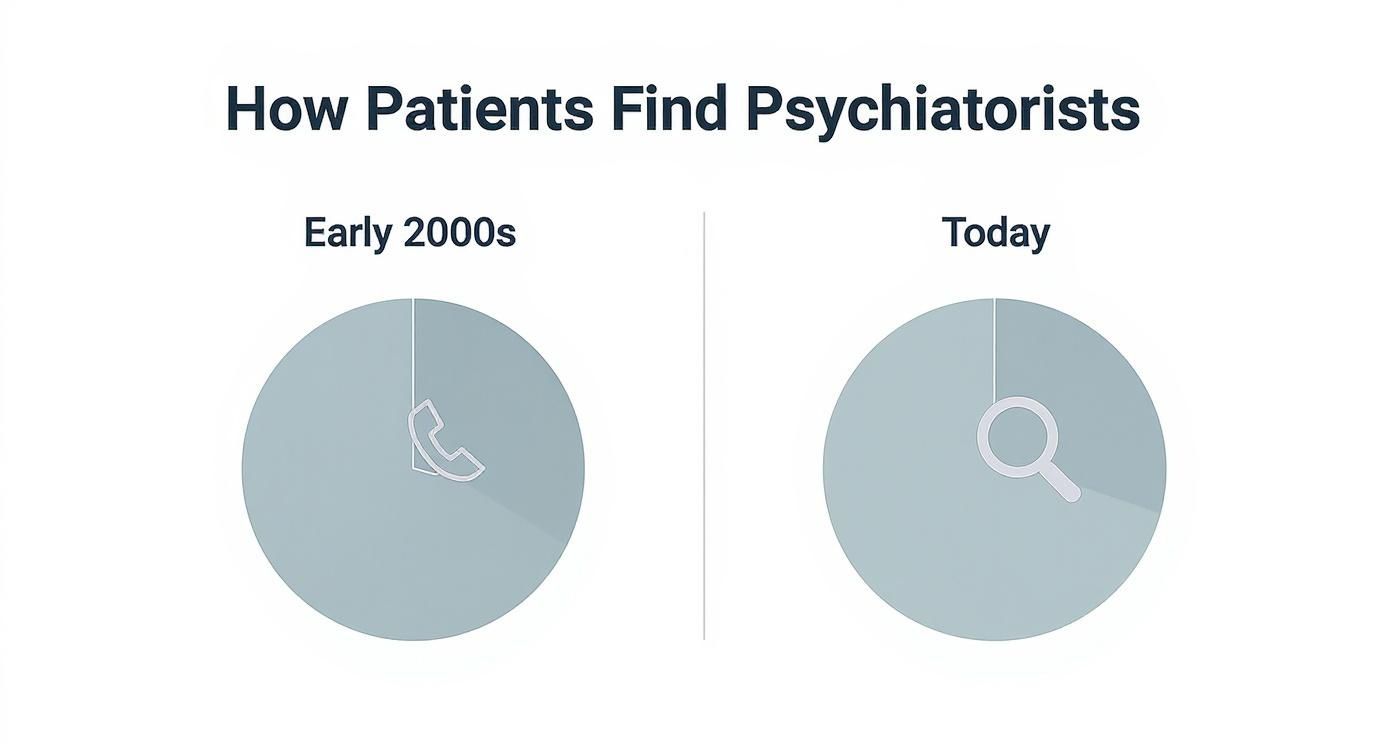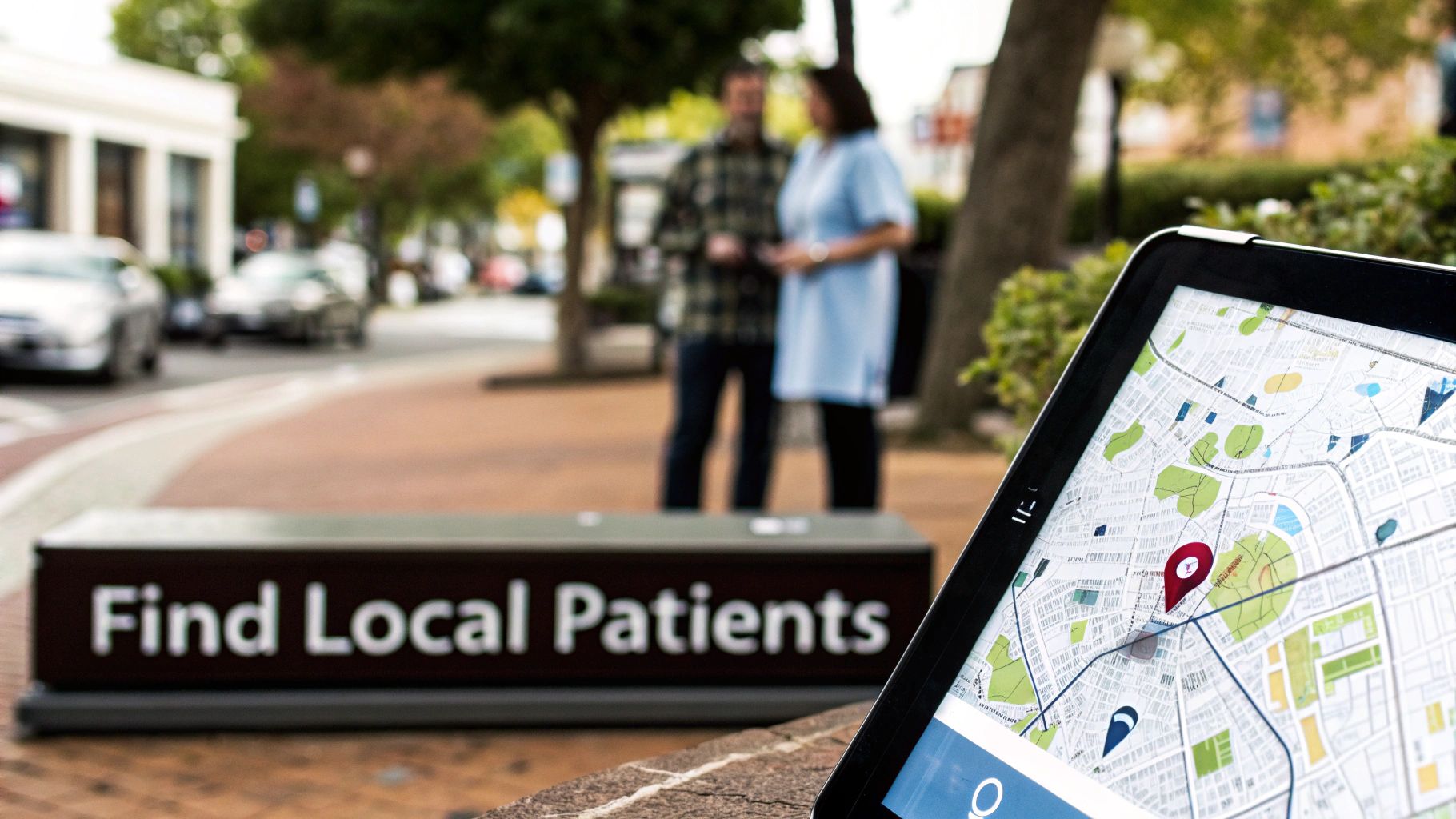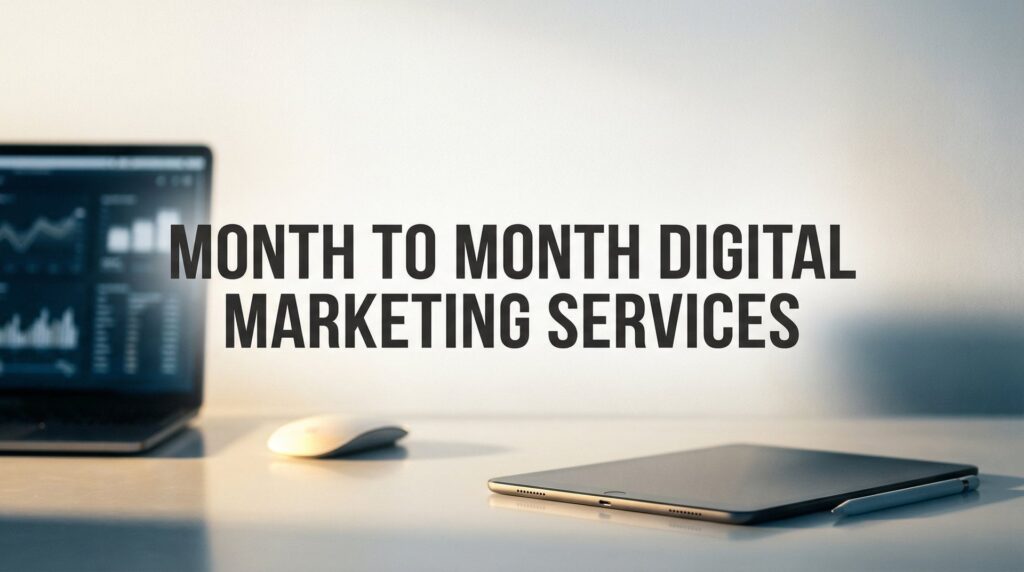SEO for psychiatrists in private practice isn't just a marketing buzzword. It's the most direct way to connect with patients who are looking online for the help you provide.
In short: It's how your practice shows up when people search on Google for a psychiatrist.
A solid SEO strategy ensures your practice has a front door that patients can actually find online.
Why Your Practice Needs to Be Visible on Google
Not long ago, a new patient found you through a referral from their family doctor. That whole process has moved online.
Today, when someone needs help with their mental health, their first step is Google. They type in things like "psychiatrist near me" or "anxiety treatment in [Your City]."
If your practice isn't on that first page of results, you’re basically invisible to most people who need you. Having a website is just the start. This is why SEO for psychiatrists in private practice is no longer optional.
The Modern Patient Journey
Think of it this way: SEO is the new word-of-mouth.
When potential patients see your practice at the top of Google, it instantly gives you credibility. They're far more likely to click your link and book a consultation.
The way patients find psychiatrists has changed dramatically.
How Patients Find Psychiatrists Then vs Now
| Method | Prominence in Early 2000s | Prominence Today |
|---|---|---|
| Physician Referrals | Very High | Moderate |
| Insurance Directories | High | Low |
| Yellow Pages/Print Ads | Moderate | Virtually Non-existent |
| Word-of-Mouth | High | Moderate (Often Digitized) |
| Google Search | Very Low | Extremely High |
| Online Health Portals | Non-existent | High |
The shift is clear. Online search is the new front line for getting new patients.

The data backs this up. A survey showed that 78% of people looking for a psychiatrist start their search online. And for every 10% jump in search ranking, clinics saw a 7% boost in appointment bookings.
Beyond Visibility to Practice Growth
Showing up on Google is about more than just website traffic. It's a key part of running a successful private practice.
It fills your schedule and lets you help more people who need it. A steady stream of patient inquiries helps you build the sustainable, fulfilling practice you envisioned.
To ensure your practice thrives, it’s vital to consider the broader business context; understanding essential business skills for healthcare leaders can provide a valuable perspective on how visibility translates to practice growth.
Winning the Local SEO Game in Your Neighborhood
For a psychiatrist, local SEO is the whole game. It's how you show up when someone in your city searches for help.
Think of it as being the most trusted practice on the busiest street in town. When someone searches for a ‘psychiatrist near me,’ local SEO makes sure your name is what they see first.
Your Most Powerful Tool: Google Business Profile
Your Google Business Profile (GBP) is your digital storefront. It's the single most critical factor in local SEO for psychiatrists in private practice.
It’s that info box on the side of a Google search. It shows your practice name, address, hours, and patient reviews.
Claiming it is free, but you need to treat it like a mini-website. Fill out every single section.

Update your hours, respond to reviews, and add photos. These signals tell Google your practice is active.
A complete profile can seriously boost direct calls and appointment requests. To really dive deep, check out this guide to mastering local maps SEO.
The Power of Consistent NAP Information
Google verifies your practice by checking your Name, Address, and Phone number (NAP) across the web. It looks for one thing: consistency.
Small differences can confuse search engines and hurt your local ranking.
In short: Make sure your NAP is identical everywhere online—your website, contact page, and all online directories. This consistency is a massive trust signal for Google.
Building Trust Through Patient Reviews
Reviews are the lifeblood of local SEO. They give potential patients the social proof they need.
Encouraging reviews is essential. You can make it easy for satisfied patients to leave feedback.
- Add a "Review Us" Link: Put a direct link to your GBP review page in your email signature.
- Make Simple Requests: For long-term patients, a simple, "Feedback is really helpful for our practice" can work well.
Always reply professionally to reviews. This shows you're engaged and care about the patient experience.
Getting local SEO right is a game-changer. Private practices that nail their local SEO have seen direct calls from search jump by as much as 110%. You can see more on the impact of SEO for private psychiatrists from this case study.
Finding the Keywords Real Patients Are Using
To get found on Google, you need to know what patients are typing into the search bar. These phrases are called keywords. They are the foundation of a good SEO strategy.
Your patients aren't searching for "psychopharmacological interventions." They're looking for a "psychiatrist who can help with anxiety medication." Getting this right is key.
Think Like a Patient
Step into the shoes of someone seeking help. Their search terms will reflect their emotional state.
Translate your clinical terms into simple, everyday language.
- Instead of "ADHD assessment," think "child psychiatrist for ADHD near me."
- Instead of "mood disorder specialist," think "how to find a psychiatrist for bipolar disorder."
- Instead of "telepsychiatry services," think "online psychiatrist who takes Blue Cross."
These longer, more specific phrases are long-tail keywords. People who use them are often ready to make an appointment.
Short Keywords vs. Long-Tail Keywords
A broad term like "psychiatrist" is very competitive. It attracts people who are just doing early research.
A specific, long-tail keyword attracts someone with an immediate need.
In short: Long-tail keywords are pure gold for a private practice. They connect you with patients who are ready for help right now.
Keyword Examples for Your Psychiatry Practice
Here’s a quick breakdown of keyword types.
| Keyword Type | Example | Patient Intent | Value to Practice |
|---|---|---|---|
| Broad (Head Term) | "psychiatrist" | Informational | Low. Very competitive and unfocused. |
| Service-Specific | "anxiety treatment" | Investigational | Medium. The person is researching solutions. |
| Local Service | "psychiatrist in San Diego" | High Commercial | High. The person is actively looking for a local provider. |
| Long-Tail Question | "how to get medication for depression" | Informational / High Commercial | High. Attracts people with a specific problem. |
| Insurance-Based | "psychiatrist who accepts Aetna" | Transactional | Very High. This is often the final search before booking. |
Focusing on the keywords in the lower half of this table will bring you more qualified leads.
Free Tools to Find Your Best Keywords
You don’t need expensive software. Google gives you great tools for free.
The Google Keyword Planner is a powerhouse for research. You can plug in ideas and get back a list of related keywords and their search volume. If you're new to the tool, this guide on how to use Google's Keyword Tool Planner is a fantastic primer.
This data helps you focus your website content on topics people are actually searching for.
Questions Real Patients Are Asking
Look at what Google's "People Also Ask" section tells you.
- How do I find a psychiatrist that takes my insurance? This shows insurance is a huge factor. Your website needs a clear page listing the insurance plans you accept.
- What is the difference between a psychiatrist and a psychologist? Answering this on a blog is a great way to attract people early in their journey.
- Can a psychiatrist help with anxiety? This seems obvious, but it's a real question. Create a page explaining exactly how you help with anxiety.
Zeroing in on these real-world questions helps you build a website that speaks directly to your ideal patients.
Writing Website Content That Reassures and Ranks
Your website's content needs to do two things. First, it must use keywords so Google can rank your site. Second, it must connect with a potential patient who is feeling vulnerable.
The real art of SEO for psychiatrists in private practice is balancing both. Your writing must be clear, empathetic, and reassuring. You're writing for a human being who needs help. Before you start, map out your plan by developing a robust content marketing strategy.

So, how do you write content that resonates and ranks?
Structuring Your Core Service Pages
Your main service pages are for things like depression, anxiety, or PTSD. They're where a potential patient decides if you're the right person to help them.
Each page should be built around a primary keyword, like "ADHD psychiatrist in [Your City]."
Weave this phrase in naturally in a few spots:
- The Page Title: The main
<h1>heading. - The First Paragraph: Mention it near the beginning.
- Subheadings: Use it in one or two
<h2>or<h3>subheadings.
After that, your goal is to explain your approach in simple, compassionate language. Ditch the clinical jargon. Instead of "psychopharmacological management," try "helping you find the right medication."
In short: Your service pages should be crystal clear about the condition, explain how you help in plain English, and have an obvious next step, like a "Schedule a Consultation" button.
Answering Questions With a Helpful Blog
A blog is a powerful tool. It’s your chance to answer the real-world questions your patients ask every day. This builds trust and authority.
More than 70% of online searches are for information, not to buy something.
By creating blog posts that answer these questions, you attract people who might not be ready to book an appointment today. But they'll remember your helpful advice when they are ready.
Think about the questions you hear all the time:
- "What's the difference between a therapist and a psychiatrist?"
- "How do I know if I need medication for anxiety?"
- "What should I expect during my first psychiatry appointment?"
Each of these is a perfect blog post topic.
Making Your Content Easy to Read
When someone is struggling, they don't want to see a giant wall of text. Making your content scannable is an act of compassion.
Here’s how to do it:
- Use Short Paragraphs: Stick to 2-3 sentences per paragraph.
- Clear Headings: Use descriptive subheadings to break up your content.
- Bullet Points and Lists: Use bullet points for lists of symptoms, benefits, or steps. They are much easier for the brain to process.
The experience on your website should feel calm and reassuring. Your content structure plays a huge role in that.
People Also Ask About Website Content
-
How do you write a good mental health website?
A great mental health website uses clear, empathetic language and avoids jargon. It should be easy to navigate, outline services, introduce the psychiatrist warmly, and provide an obvious way to book an appointment. -
What content should a therapist website have?
A therapist or psychiatrist's site needs an "About Me" page, detailed service pages (e.g., depression, anxiety), an insurance and fees page, a contact page with a map, and a helpful blog. -
How do I get my psychiatry practice to show up on Google?
Focus on local SEO. This means optimizing your Google Business Profile, using the keywords patients are searching for, and creating useful content that answers common questions.
A Quick Technical SEO Health Check for Your Website
"Technical SEO" is just about making sure your website has a solid foundation. This helps Google find, understand, and trust your site.
You don't need to be a coding whiz. It’s like making sure the lights are on and the doors are unlocked for search engines. This behind-the-scenes work is just as important for Google as it is for your potential patients.
Page Speed Isn't Just a Suggestion
How fast your website loads is a big deal. A slow page makes people leave. A potential patient who's already stressed won't wait around.
Because of this, page speed is a major ranking factor for Google. A fast, responsive site means a better user experience. A great free tool for this is Google's PageSpeed Insights. Just pop in your URL and it’ll give you a score and feedback.
Your Site Must Work Flawlessly on a Phone
Most people looking for a psychiatrist are on their phone. If your website is a mess on mobile, you’re losing them.
A mobile-friendly website is the standard. Text should be easy to read without zooming, and buttons need to be easy to tap.
In short: Google uses a "mobile-first" approach. It looks at the mobile version of your site first for ranking. If your mobile site is hard to use, you'll have a hard time ranking well.
Nailing the On-Page SEO Basics
"On-page SEO" means optimizing individual pages. These small tweaks tell Google what each page is about.
Here are the most important things to check:
- Catchy Title Tags: This is the blue headline in Google search results. It should include your main keyword and be around 50-60 characters.
- Clear Meta Descriptions: This is the blurb under the title tag. A good one convinces a searcher to click your link.
- Logical Headings (H1, H2, H3): Use headings to structure your content. The main title should be an H1. Subtopics go under H2s and H3s.
- Image Alt Text: This is a short, written description of an image. It tells search engines what the image shows and is essential for accessibility.
These small details add up. For more on these signals, see this guide on local SEO services for small businesses, which are critical for a private practice.
Answering Your Top SEO Questions
SEO can feel intimidating at first. Let's walk through some of the most common questions from psychiatrists just starting out.
How Long Until I See Results from SEO?
The most honest answer is, "it depends." SEO is a long-term strategy, not an overnight fix.
You can often see early signs with local SEO within 2 to 4 months. But for lasting results—ranking for competitive keywords—you're looking at a 6 to 12-month commitment.
The timeline varies based on:
- Your Location: Ranking in a small town is easier than in a major city.
- Competition: Are other local psychiatrists already well-established online?
- Your Website's Age: A new site takes longer to build trust with Google.
In short: Treat SEO as a marathon, not a sprint. The steady work you put in will build a reliable stream of new patient calls for years.
Can I Just Do This Myself, or Do I Need to Hire Someone?
You can absolutely handle the basics of SEO yourself. I encourage it!
Here are some things you or your staff can manage:
- Claiming and filling out your Google Business Profile.
- Ensuring your practice name, address, and phone number (NAP) are identical everywhere.
- Asking for and responding to patient reviews.
- Writing clear service descriptions for your website.
It makes sense to hire an expert for more technical or time-consuming tasks. This includes deep keyword research, technical audits, or building a long-term content strategy for SEO for psychiatrists in private practice.
If I Only Have Time for One Thing, What's Most Important?
Easy. Pour everything into mastering your local SEO.
Your number one priority should be your Google Business Profile. It’s your digital front door. A complete, active, and well-reviewed profile can get your phone ringing directly from search results.
What Should I Expect to Budget for SEO Services?
SEO costs vary. Think of it as an investment, like leasing a great office space.
Here's a rough idea:
- Basic Local SEO: This covers your Google Business Profile and local directory listings. Expect $500 to $1,500 per month.
- Comprehensive SEO: This includes local SEO, new content, on-page optimization, and technical monitoring. Plans often start around $2,000 to $5,000+ per month.
When looking at agencies, ask for transparency. They should tell you exactly what you're paying for and how they'll track progress.
Ready to stop being invisible online and start connecting with the patients who need you most? At Clicks Geek, we specialize in creating targeted SEO strategies that fill your calendar. Let us handle the complexities of digital marketing so you can focus on what you do best. Learn more about our SEO services and schedule a consultation today!
Want More Leads for Your Business?
Most agencies chase clicks, impressions, and “traffic.” Clicks Geek builds lead systems. We uncover where prospects are dropping off, where your budget is being wasted, and which channels will actually produce ROI for your business, then we build and manage the strategy for you.





